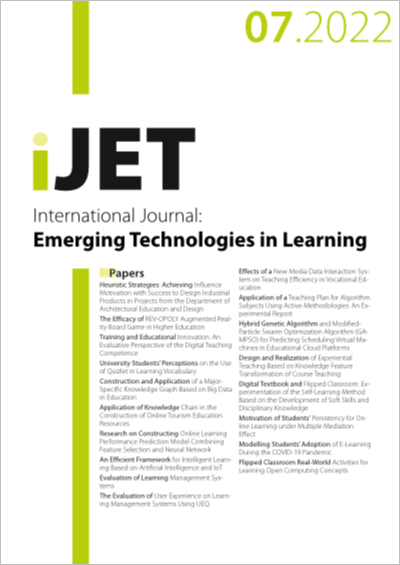Hybrid Genetic Algorithm and Modified-Particle Swarm Optimization Algorithm (GA-MPSO) for Predicting Scheduling Virtual Machines in Educational Cloud Platforms
DOI:
https://doi.org/10.3991/ijet.v17i07.29223Keywords:
Virtual Machine Scheduling, Cloud Environment, Optimizing Resources, Hybrid GA-MPSOAbstract
Cloud computing is expanding gradually as the number of educational applications is rapidly increasing. To get Educational cloud services, internet connectivity is predominantly important and Cloud Environment uses one of the basic technology to manage the Physical servers effectively ie; Virtualization Technology. In Cloud Computing, the data centers host numerous Virtual Machines (VMs) on top of the Servers. Due to the rapid growth of Educational platforms, the workload of the VM is computationally getting increased. In the Cloud Educational platforms, to execute the jobs IT resources are provisioned over the network. Since the data generated from the client-side is dynamic in nature, it is difficult to allocate the computational resources efficiently. So to enhance the energy efficiency and to provide the resources in an optimized way, a VM Scheduling mechanism with Hybrid Genetic Algorithm-Modified Particle Swarm Optimization (GA-MPSO) is proposed in this work to achieve QoS parameters like reduced Energy consumption, SLA violation, and cost reduction over the heterogeneous environments. The Hybrid G-MPSO develops the optimal range and improves the best range of scheduling the Virtual resources to VMs from Physical Machines (PMs). The proposed approach, when compared to other VM scheduling algorithms, it intensifies the energy consumption to 105KWH, SLA violation rate of 0.08%, reduces the migrations count to 2122, and consumes the overall cost of 2567.68$. The different scheduling methods for VMs are evaluated against the results, which show that the Hybrid GA-MPSO method is far better than the existing algorithms.
Downloads
Published
How to Cite
Issue
Section
License
Copyright (c) 2022 Supreeth S, Kirankumari Patil

This work is licensed under a Creative Commons Attribution 4.0 International License.



